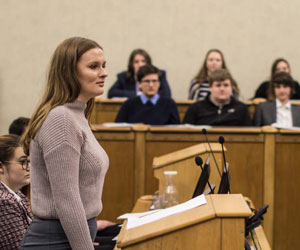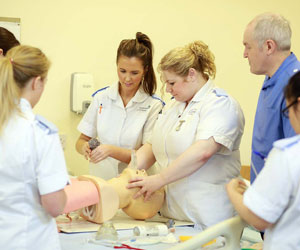If you have a background in psychology, sociology or criminology, our course is ideal for gaining greater insight into the effects of being abusive or being abused. You'll develop a comprehensive knowledge and understanding of a broad range of topics pertinent to interpersonal violence and abuse. We look at the impact of abuse in different international, cultural and social contexts, and you'll have the chance to examine practice and research from theoretical perspectives. To learn more about how violence and abuse affects our lives, sign up for our programme!
Graduate destinations
This course can lead to careers in social work, mental health contexts and the children's workforce.
Course outline
Course summary
We offer a stimulating and challenging environment where you can build on your existing learning experiences to advance your academic and professional development. You will gain specialised knowledge and a critical awareness of issues at the forefront of interpersonal violence and abuse studies. Teaching is done through a variety of blended learning and campus-based activities explicitly designed to meet the needs of learners working in a range of contexts.
Modules
Year one
Compulsory Modules
- Professional Values and Ethics
- Interpersonal Violence and Abuse studies
- Psychology of Violent Behaviour
Programme Specification
Programme Specification
For a detailed summary of all course content please read our programme specification for this course.
Assessment, Feedback, and Teaching and Learning methods
Full details are available in the programme specification.
Timetables
The teaching timetable should be available from the end of August. Access to the timetable is through the Student Hub – you will be able to access the Student Hub after you have completed online registration. The teaching day is 9am to 6pm, Monday to Friday; please keep your other commitments open until confirmation of your teaching timetable, and bear in mind that many courses will offer placements or fieldwork which sometimes extends into the evenings and weekends.
Entry requirements
Have a question about our entry requirements?
Entry Requirements
1st or 2nd class honours degree.
Students with other qualifications may be admitted to the course, please contact the Enquiry Centre for further details.
Accreditation of Prior Learning (APL) may be considered for relevant prior learning at the same academic level.
More information about levels and credits.
Application information
Making your application
Applications should be made online directly to the university - visit our website or contact enquirycentre@cumbria.ac.uk for details and guidance. There is no official closing date but we would encourage you to apply as early as possible, as many courses are competitive.
What makes a good application?
We consider all aspects of your application, not simply your qualifications and grades. We look at your academic background and performance, relevant experience (particularly for professional courses where some voluntary or paid experience is required) and your reference. Above all, we look for motivation, commitment and potential - evidence that you can benefit from study at higher education level.
Make sure you include:
- Relevant qualifications/evidence of ability: check our website for the specific entry requirements required for each course. Tell us your previous academic results and your projected grades.
- A supportive reference, from an employer or your school or college.
- A good personal statement.
Explain clearly what attracts you to the course and tell us about your wider interests and experience. If you are applying for a course that incorporates professional training and placements, you should include any relevant experience or visits you have made in the workplace. Highlight your individual strengths and qualities, personal skills, capacity for teamwork, contribution to the community and your enterprise, originality and determination. Select some activities which bring out these qualities.
What next?
When we receive your application, we will send you an acknowledgement and if you are successful at this stage you will get either an offer (with an invitation to visit the campus to which you have applied), or an invitation to interview on a particular date. If we are not able to offer you a place on your chosen course we will usually try to offer you a place on a similar course and will contact you to discuss this. Alternatively, if we think you are suitable, but cannot offer you a place on your preferred campus because of the level of competition, we will offer you a place at another campus if one is available.
And if I accept?
The admissions team will contact you and send further information from February onwards about accommodation, and from May/June onwards about preparing to join the university. If you have any other queries, please telephone the admissions offices for information and advice on 0845 6061144.
Deferred entry
We welcome applications for deferred entry on some courses. If you have specific plans during your year out, indicate these on your personal statement as they may be relevant to your course and could enhance your application.
International students
Please see the international pages of our website for full details of our entry requirements (including English-language skills) as well as contacts for advice and support.
From 2009 the UK Border Agency introduced a Points-Based Immigration System (PBS) for students coming to the UK from outside the European Economic Area (EEA).
Students entering higher education will need to obtain a Confirmation of Acceptance (CAS) plus finance confirmation to obtain a Tier 4 student visa.
UK education providers are licensed by the UK Border Agency. When students apply for their visa (or entry clearance) they will need a valid Certificate of Acceptance of Studies from the university. Please note that a CAS is not a guarantee that a visa will be issued.
See the following websites for further details:
Student finance
We have a wide range of scholarships, bursaries, grants and funds available to support you throughout your studies with us. This includes the Cumbria Bursary - a non-repayable bursary designed to support first year students with a household income of less than £25,000..
Student Finance Tuition Fee Policy





